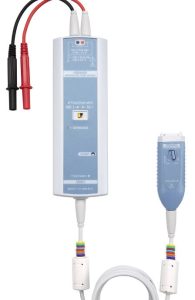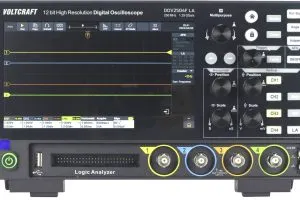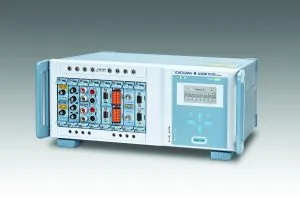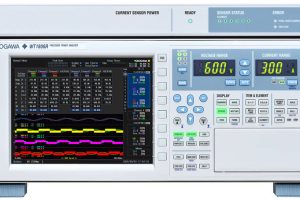
“Applications for, and production of, next-generation power devices utilising silicon-carbide technology necessitates ultra-precise measurement of high-voltage and higher speed signals,” according to the company.
PBDH0400 is the name, and 702922 is the part number. Due to its interface connector and power supply, it can only be used with Yokogawa oscilloscopes DLM3000, 3000HD, 5000 or 5000HD.
Attenuation is switchable between 1,000:1 and 100:1 – the nominal output voltage is up to ±2V.
The all-important CMRR (common-mode rejection ratio) is -80dB at 60Hz), -50dB at 10MHz), -30dB at 100MHz) and -20dB at 400MHz.
±2,000V is the maximum dc or peak ac voltage to ground, and also differentially in the 1000:1 mode. Set to 100:1, it is ±200V dc or ac peak. For five seconds, ±3kV can be withstood without damage.
For safety purposes, the unit is rated CAT II 1,000V and CAT III 600V.
Input impedance to ground is ~6MΩ and ~5pF.
A related probe, 702921 (pictured – they look similar), is rated for ±1,000V use (1.5kV for 5s) and has 500:1 and 50:1 attenuation settings.
Both of them have a specific connector the the scopes mentioned above, which takes power from the instruments and delvers it to the probe, as well as passing the attenuation switch setting to the scope. “Attenuation ratio is automatically recognized and set along, with the input impedance. This eliminates the need for
settings,” said Yokogowa.
Head dimensions are 173.5 x 58 x 26.5mm, and the connector box is 80 x 29 x 24mm.
Applications are expected with SiC and GaN-based electronics in electric vehicle chargers and traction inverters, power generation inverters, industrial drives and household appliances.
Find the product pages here:
2kV 702922 differential probe
1kV 702921
 Electronics Weekly
Electronics Weekly



